- Home
- Cheryl Bolen
The Earl, the Vow, and the Plain Jane Page 4
The Earl, the Vow, and the Plain Jane Read online
Page 4
Being aware of her, though, was nothing like actually being attracted to her. He was an earl, after all. His looks and title could win any woman's heart. A man who could have any woman he chose would never settle for a drab thing like her.
Of course, tonight he had destroyed her high opinion of him.
"Oh, yes," she said. "I've always been a great admirer of your brother. I'm sorry to learn that he's under an obligation he is unable to fulfill. Pray, is there any way I can help?" Perhaps now he would tell her more about the mysterious Vow.
He shook his head sadly. "Not unless you had a fortune."
She shrugged. "You know what they say about us Featherstones?"
"Indeed." He gave her a sheepish grin. "You don't have a feather to fly with."
They both laughed.
"The pity of it is, the money poor Jack needs will be impossible to raise. Unless he . . .well, there's nothing for it but to . . ." He looked around to make sure no one was listening, and then he lowered his voice. "marry a considerable heiress."
She could stand it no longer. Now he was blathering, and he hadn't got to the point! "Why must he possess a considerable fortune? Pray, what was the Vow?"
He looked taken aback. "Did I not say?"
"No, you did not."
"Well, then, Papa asked Jack to save Dunvale Castle, to bring it back to glory. You must know the old pile is crumbling."
"Actually, I've never been to Dunvale."
"There's little to see anymore. We're reduced to occupying but two floors in one wing. It's really ghastly. The turrets have tumbled, and the keep has kaput."
She felt ashamed of herself for giggling over so serious a problem, but Captain St. John was most entertaining. "How long has the castle been in your family?"
"That's the pity of it. Since the Conquest."
"Oh, dear. I do see why your father was so keen to preserve it."
"But his request, you must own, was beastly unfair to Jack."
"Without question."
"There are also the girls."
"You mean your younger sisters?"
"Yes."
"How many of them are there?"
"Three."
"I see. Lord Slade must present them and dower them?"
He nodded. "In time, I think he'll be able to manage that. He's very clever about economizing, and he has no vices like gaming and. . .well, you know the sorts of things a lot of bloods do."
Her nose wrinkled with distaste. "Indeed."
"He's bought my commission, so that at least is behind him."
"One down. Three to go."
"Exactly," he said, smiling. "Allow me to pour your wine." He filled her fine crystal glass with a French wine. Jane supposed Lord Spencer had filled his cellars back in '02 after the Treaty of Amiens had provided a temporary respite from war with France.
Though she had been ravishingly hungry, her appetite vanished. How terribly she had misjudged Lord Slade. She should have known the man who had always championed the unfortunate would be just the sort to sacrifice his own happiness in order to help others. Not that marrying Lady Sarah would exactly be sacrificing his happiness. Lady Sarah was all any man could want in a wife.
But somehow she did not think Lady Sarah was the sort of wife Lord Slade would have selected, had he free choice.
She looked up and down the table and all around the room, searching for Lord Slade, but he was not there. "Where is your brother?"
"He's gone. Must have left about an hour ago."
"Without dancing?"
Captain St. John shrugged. "Now that you mention it, I don't remember seeing him on the ballroom floor all night. Of course, balls have never been to Jack's taste."
She need not ask why he had chosen to come tonight. "What about you, Captain? Do you like to attend balls?"
He glanced across the table at Lady Sarah. "Very much." His gaze returned to Jane. "It's gratifying to find so many lovely ladies all in the same room."
She could well believe he was quite the ladies' man. In temperament, the brothers were as dissimilar as she and Lady Sarah.
She pushed away her untouched plate of sweetmeats. Her heart went out to poor Lord Slade, who was so weighed down caring for his family and worrying about that wretched Vow. Not that there was anything she could do to help him. It wasn't as if she could order her cousin to fall in love with him.
Could she even try to assist him in his quest?
What a heartbreaking choice she had to make.
Chapter 4
"Oh, dearest, I just remembered we'll have to add one more plate," Mr. Featherstone said to his daughter.
Jane drew a long breath, gritted her teeth, then whirled around to face her father. "Now you remember to tell me—when the guests should be here in less than ten minutes." She stormed to the butler-less butler's pantry to fetch one more plate, her father's shuffling gait trying to catch up with her.
"What's one more?" he asked, shrugging.
She grabbed another gilt-edged dish and hastened back to the dining room. "It's not just one more plate, it's one more mouth to feed. Do not dare to take a second helping of turbot!"
He threw up his arms. "Why are you in such a dust-up today, love? You act as if we're entertaining the king himself."
"I am not in a dust-up. I'm trying to be my father's competent hostess." Her voice softened as she met his gaze. "Pray, Papa, who is this unexpected guest?" All she'd been able to think of all afternoon was one specific guest. Lord Slade.
"A fellow by the name of Cecil Poppinbotham."
"I'm certain I would remember that name. Are you sure he's in Parliament?"
"Not yet. Wilhampton says that Poppinbotham's keen to stand for the Plymouth seat and that he's got significant funds to finance it."
"His own money?" She rearranged the plates on one side of the table in order to squeeze in one more.
Her father carried another chair to the overcrowded table. "Yes. The man's a printer. Made a fortune publishing penny pamphlets."
"I don't think I've read penny political pamphlets." Miss Featherstone stood back and admired her work. Neither the table nor the dining room was more than a quarter the size of her uncle's, Lord Clegg's, yet the elegance of Mama's delicate plate and the baroque silver epergne could not be surpassed at any of London's finest homes.
"Oh, they're not political. They're religious. Moral tales and the like."
"Then I daresay I've purchased a few," she said. "But why does the gentleman wish to come here?"
"Apparently he wants to represent Whigs."
A rapping sounded at the door, but of course her father did not hear it—though he would never admit he was losing his hearing. "Do go and get the door, Papa. Our first guest must have come." Her thoughts flitted to Lord Slade. One who was used to a house full of servants was probably not accustomed to residents answering their own doors.
She recounted the place settings, then scurried down the backstairs to the kitchen to see if Mrs. Nolan and the half-day cook should need her.
By the time she strolled into the drawing room several minutes later, each of the invited guests had assembled. Including Lord Slade.
All the gentlemen accorded her the courtesy of standing when she entered the chamber. One second of recognition, then her gender would be completely forgotten when the discussions began.
Mr. Fortorney, a longtime colleague of her father's, addressed the devastatingly handsome Lord Slade. "May I say how honored we are that you still embrace us, my lord?"Lord Slade's gaze flicked to Jane for the briefest second before he answered. "The honor is entirely mine. I had not realized until I spoke with Miss Featherstone yesterday how very much I had missed these stimulating talks." His voice lowered. "How much I miss serving in the House of Commons."
"Oh, come now, Slade," her father said, "you cannot be sorry to have inherited a title and Dunvale Castle."
His lordship gave a bitter laugh. "While I have some affinity for the family name and for Dunv
ale, I have never admired the English system of aristocracy."
"Why is that?" Mr. Goldfinch asked.
"I find men admirable for the deeds they've done—not for actions of long-ago ancestors. When I'm on my deathbed, I don't want to be remembered as the fourth Earl of Slade. I wish to be remembered for any good I may have done for my fellow man."
"Dare I offer an opposing comment at my first foray into the Whig inner circle?"
All eyes turned to the speaker, the newcomer, Mr. Cecil Poppinbotham.
Jane took this opportunity to study the printer. She judged his age to be forty for his slickened black hair—most fashionably styled—was threaded with gray. His rather gaunt face was at odds with the jauntiness of his dress. In fact, his whole manner of dress was that of a much younger man, perhaps a dandy on his first visit to Town.
The white stripe that ran vertically along his rust-coloured pantaloons matched the linen of his cravat, but there all coordination ended. His waistcoat was of lime green, his jacket a deep plum, and his shoes a peculiar shade of gray. There was a certain crispness about his clothing that attested to its newness, and the tailoring seemed very fine, indeed. No doubt, he had spared no expense in his quest to be a popinjay.
Instead of thinking ill of him, though, Jane determined to be extra solicitous toward the poor fish out of water. She also realized the uninitiated like him might believe members of the House of Commons were truly common, when in actuality the majority consisted of peer's younger sons and brothers and others sponsored by powerful aristocrats.
"Please do, Mr. Poppinbotham," her father said.
"I believe it's unEnglish to lambast our system of aristocracy."
Mr. Arthur nodded. "Daresay, I agree with you!"
Mr. Poppinbotham preened. "People who oppose our system of peerage are cut from the same cloth as those who guillotine kings, meaning no offense to you, your lordship."
Lord Slade merely nodded at the newcomer, a sliver of a smile tilting at the corners of his mouth. Miss Featherstone ran an appreciative eye over the earl. The somberness of the muted browns he wore certainly did not compete with the newcomer's foppish clothing.
The drawing room door opened, and everyone eyed the gray-haired Mrs. Nolan. The matronly housekeeper had kept everything in the Featherstone house running smoothly for more years than Jane had existed. "Dinner's on the table," she announced, then she returned to the kitchen.
As they moved into the dining room, Jane watched Mr. Poppinbotham with amusement as he paused in front of the gilt-framed mirror, screwed up his mouth into a self-satisfied smile, and pet his greasy hair in the same loving way one pets a favored dog. Even as he walked away, he could not quite relinquish his reflective view—until he bumped into the door jamb.
Besides her father and herself, seven others gathered around the rectangular table and began to fill their plates from steaming bowls that spread across the starchy white cloth.
After the diners had filled their plates, Mr. Featherstone said, "Tell me, Mr. Poppinbotham, what made you decide to stand for Plymouth?"
That he had not quite finished chewing his Brussels sprouts did not stop Mr. Poppinbotham from immediately responding. "I had the honor of meeting his grace, the Duke of Hawthorne, last month at the opening of a Sunday school he sponsored. At a small reception afterward, he was saying he hoped a Whig would stand for Plymouth, but it would take a man of means. By the manner in which he observed the quality of my dress, it was obvious he was referring to me. Though I'm not given to boasting, I had to, in all truthfulness, admit to his grace that I am perhaps the most prosperous prin . . ., er, publisher in the kingdom."
"So you announced your candidacy then and there?" Lord Slade asked.
Mr. Poppinbotham nodded. "I felt it my duty to give of myself for my country."
"Very commendable," said Jane's kindly father before turning to the earl. "You, my lord, are certainly facing an uphill battle in the House of Lords with your support of labor unions." His gaze flicked to Jane. "What was it Lord Symthington said last week?"
"If he had to increase wages for the colliers in his mines," Jane said, rolling her eyes, "it would force him to close them. And, of course, everyone knows Lord Symthington's mines have been exceedingly prosperous."
"Indeed," Lord Slade said, "in the past year alone he's purchased a yacht large enough for the Royal Navy and a castle in Ireland that's larger than his castle in Scotland."
"He spouts much the same thing as Lord Bingley said about his prodigious stables," Mr. Goldfinch said with a chuckle.
"Yes," Lord Slade added, a gleam in his black eyes. "If all the grooms were to unionize, he'd have to sell off the finest horseflesh in the kingdom. It does seem to my colleagues that if the citizenry were given decent wages, it would run the entire country into the ground."
"I had the good fortune to view Lord Bingley's stables," Mr. Poppinbotham interjected.
Lord Slade's brows lifted. "Then you enjoy the races at Newmarket?"
"No. No." Mr. Poppinbotham vigorously shook his head. "Never been to Newmarket in my life. I neither gamble nor ride."
"I expect your pr . . ., publishing concerns keep you enormously busy," Jane said.
"Indeed they do, Miss Featherstone."
"Tell me, Mr. Poppinbotham, does Hannah More write for you?" Mr. Featherstone asked.
"I have had the honor of publishing some of her tracts."
Lord Slade cast a glance down the table at Mr. Poppinbotham. "They must sell exceedingly well."
"Allow me to say I wish I had three of her." Mr. Poppinbotham helped himself to a second serving of turbot, leaving the serving dish empty of everything save the buttery French sauce.
"How many are employed by your publishing company, Mr. Poppinbotham?" Lord Slade asked.
The printer puckered his lips, peered at the ceiling, and mumbled numbers before responding. "I employ a dozen printers, and of course there are the writers, who you might say are the backbone of the business. Then there are the lads who . . .distribute our work. That amount varies considerably. I'd say there are a couple of hundred of them."
"There has been talk of a printers' union," Jane said.
Mr. Poppinbotham's brows lowered. "Yes, I've heard."
"Surely a generous man like yourself," Mr. Featherstone said, "a man who feels compelled to give to his country would not object to the unionization of the printers who work for him."
The printer flicked a glance at Jane before answering. "No, of course not, though my men are already paid a decent wage."
"Very commendable." Mr. Featherstone smiled. "Returning to Mrs. More, I met her once. A most righteous woman. What a pity her sympathies are so firmly with the Tories."
Mr. Poppinbotham's mouth gaped open. "'Pon my word, I did not know that!"
"Like all Tories, she no doubt has a reverence for the monarchy," Lord Slade said.
"Even for mad kings," Mr. Goldfinch said with a laugh.
Jane frowned. "I beg that you not disparage our unfortunate king."
"While I'm no admirer of monarchies, I would never wish either our king or our Regent ill," Mr. Goldfinch defended.
"It's not as if they have power such as the Bourbons enjoyed—and squandered." Lord Slade's gaze swept across the table. "Thankfully our Parliament holds the most power."
Mr. Featherstone nodded. "And controls the Civil List."
Jane smiled to herself, recalling how the government trimmed some of the extravagant requests in the Regent's last Civil List.
"Since you don't approve of the peerage system," Mr. Poppinbotham said to Lord Slade, "does that mean you'd be happy to do away with the monarchy?"
"I'd be no happier abolishing the monarchy than I'd be tearing down my family home, Dunvale Castle. We English have a great respect for tradition."
Mr. Goldfinch attempted to steer the conversation to a neutral subject. "Miss Featherstone, I read in this morning's newspaper of your kinswoman."
Jane's brows lifte
d. "Lady Sarah?"
Mr. Goldfinch nodded. "It appears she's expected to be the Season's most sought-after prize."
"I cannot imagine anyone else could be possessed of all the attributes that have been bestowed upon my cousin." Jane's gaze flicked to Lord Slade, whose lids were downcast.
"Pray, Miss Featherstone," Mr. Poppinbotham said, "how are you related to Lady Sarah?"
"My mother, Lady Mary, was sister to the present earl, Lady Sarah's father."
"Lady Mary's father was, of course, the previous earl," Mr. Fortorney said.
"And I must say I do have a great reverence for Monmouth Hall, where my mother grew up." Jane smiled just thinking of the stately old home nestled among the gentle hills of the Peak District.
Dinner conversation returned to politics, and Jane took the opportunity to study Lord Slade. He possessed as many attributes as Lady Sarah, though their qualities were in different areas. While he lacked a fortune like her cousin's, his knowledge vastly exceeded hers. Together, they would complement one another and would make a spectacular couple.
Jane had slept little the night before. Her dilemma had kept her awake. Before she made a false step, she had to be certain a union between his lordship and her cousin was in the best interest of both. Then she realized no one would ever take a step if they waited for assurances about the future. Only fools could think themselves certain of the future.
At the end of the evening as the gentlemen began to leave, she escorted Mr. Poppinbotham to the entry hall, and he held her hand a few seconds longer than necessary. "I have business in St. Albans tomorrow, but I beg that you allow me to call on you the day after tomorrow, Miss Featherstone," Mr. Poppinbotham said.
So surprised was she over his interest in her, it took her a few seconds to realize what he meant. The man means to court me. He was as far from Lord Slade as a workhouse was to a palace. Just as far removed as she was from Lady Sarah. With a sinking heart, she knew how she had to reply. "Certainly, Mr. Poppinbotham."
His step seemed lighter as he moved to the door.
Lord Slade left next. His brows had been lowered as he watched Mr. Poppinbotham leave, but when he faced Jane, he was all smiles.

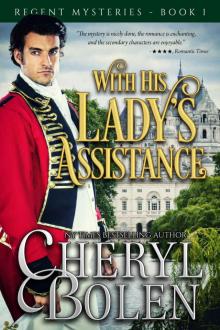 With His Lady's Assistance (The Regent Mysteries Book 1)
With His Lady's Assistance (The Regent Mysteries Book 1)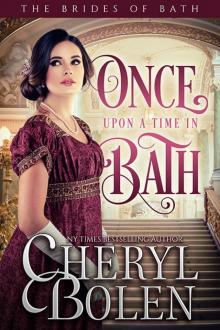 Once Upon a Time in Bath
Once Upon a Time in Bath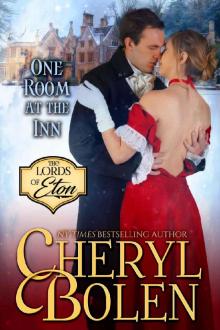 One Room at the Inn (The Lords of Eton Book 4)
One Room at the Inn (The Lords of Eton Book 4)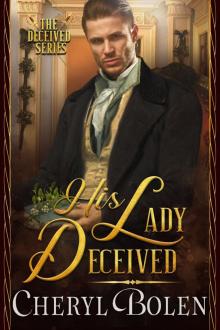 His Lady Deceived
His Lady Deceived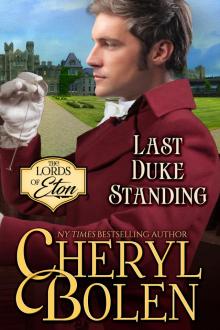 Last Duke Standing
Last Duke Standing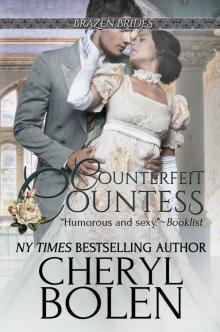 Counterfeit Countess: Brazen Brides, Book 1
Counterfeit Countess: Brazen Brides, Book 1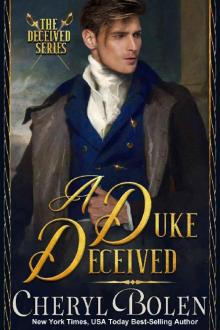 A Duke Deceived (The Deceived Series Book 1)
A Duke Deceived (The Deceived Series Book 1)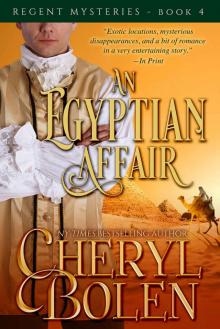 An Egyptian Affair (The Regent Mysteries Book 4)
An Egyptian Affair (The Regent Mysteries Book 4)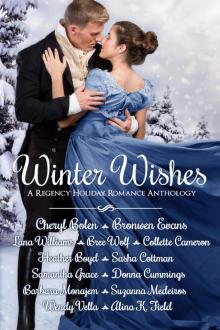 Winter Wishes: A Regency Christmas Anthology
Winter Wishes: A Regency Christmas Anthology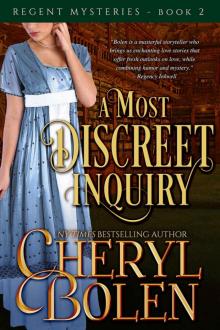 A Most Discreet Inquiry (The Regent Mysteries Book 2)
A Most Discreet Inquiry (The Regent Mysteries Book 2)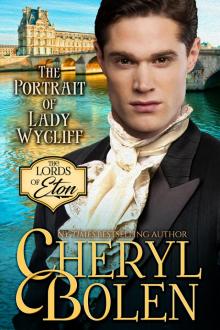 The Portrait of Lady Wycliff
The Portrait of Lady Wycliff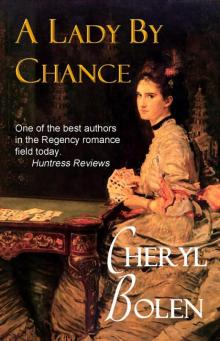 A Lady by Chance (Historical Regency Romance)
A Lady by Chance (Historical Regency Romance)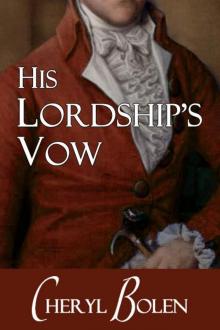 His Lordship's Vow (Regency Romance Short Novel)
His Lordship's Vow (Regency Romance Short Novel)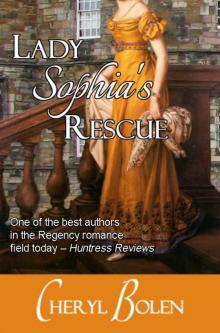 Lady Sophia's Rescue (Traditional Regency Romance)
Lady Sophia's Rescue (Traditional Regency Romance)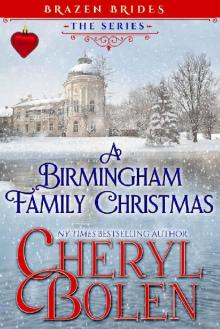 A Birmingham Family Christmas
A Birmingham Family Christmas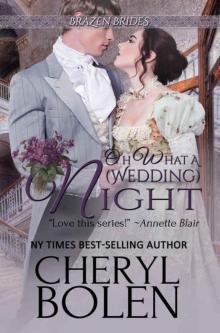 Oh What A (Wedding) Night (Brazen Brides #3)
Oh What A (Wedding) Night (Brazen Brides #3)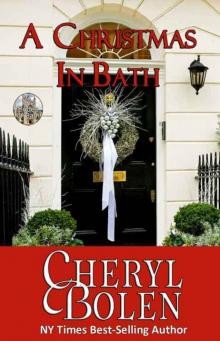 A Christmas In Bath
A Christmas In Bath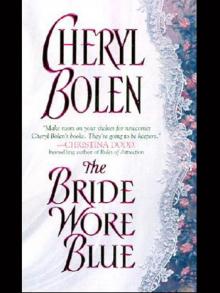 THE BRIDE WORE BLUE
THE BRIDE WORE BLUE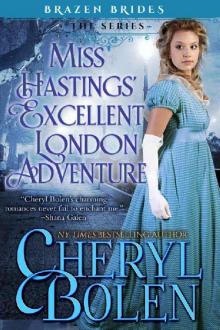 Miss Hastings' Excellent London Adventure (Brazen Brides Book 4)
Miss Hastings' Excellent London Adventure (Brazen Brides Book 4)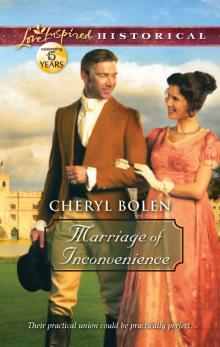 Marriage of Inconvenience
Marriage of Inconvenience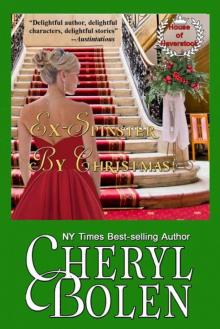 Ex-Spinster by Christmas: House of Haverstock, Book 4
Ex-Spinster by Christmas: House of Haverstock, Book 4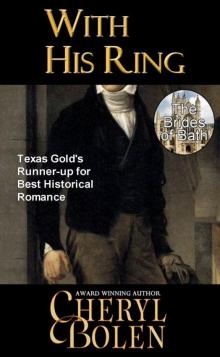 With His Ring (Brides of Bath Book 2)
With His Ring (Brides of Bath Book 2)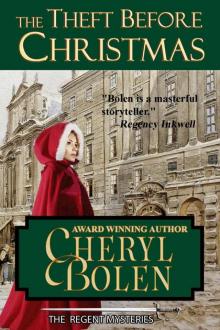 The Theft Before Christmas (The Regent Mysteries)
The Theft Before Christmas (The Regent Mysteries)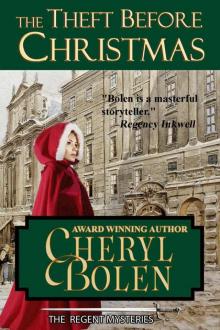 The Theft Before Christmas
The Theft Before Christmas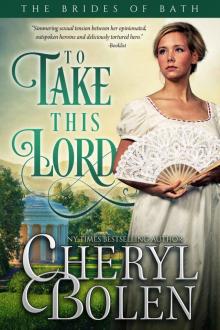 To Take This Lord (The Brides of Bath Book 4)
To Take This Lord (The Brides of Bath Book 4)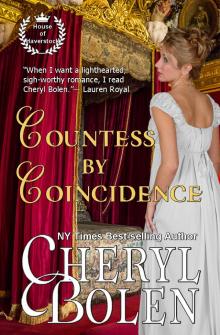 Countess by Coincidence
Countess by Coincidence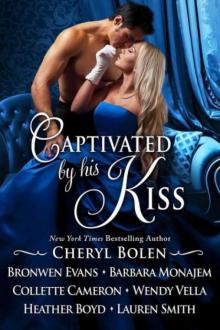 Captivated by His Kiss: A Limited Edition Boxed Set of Seven Regency Romances
Captivated by His Kiss: A Limited Edition Boxed Set of Seven Regency Romances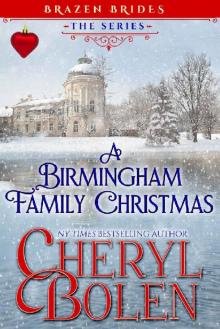 A Birmingham Family Christmas (Brazen Brides Book 5)
A Birmingham Family Christmas (Brazen Brides Book 5)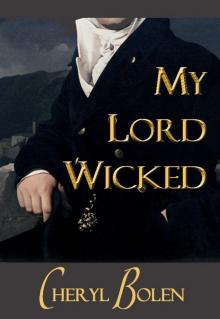 My Lord Wicked (Historical Regency Romance)
My Lord Wicked (Historical Regency Romance)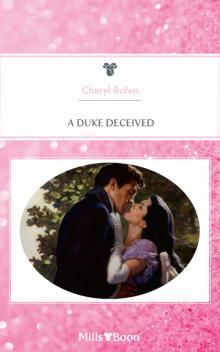 A Duke Deceived
A Duke Deceived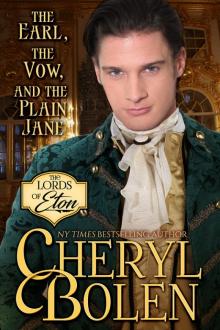 The Earl, the Vow, and the Plain Jane
The Earl, the Vow, and the Plain Jane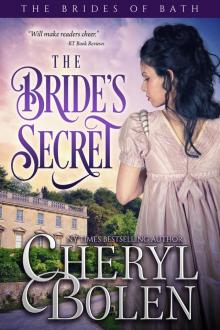 The Bride's Secret
The Bride's Secret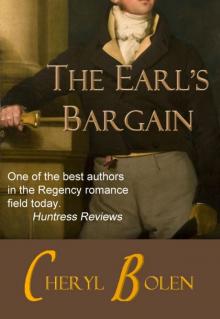 The Earl's Bargain (Historical Regency Romance)
The Earl's Bargain (Historical Regency Romance)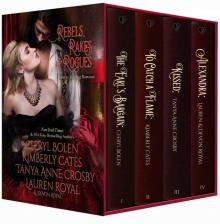 Rebels, Rakes & Rogues
Rebels, Rakes & Rogues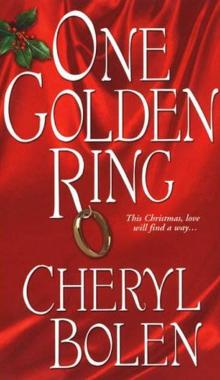 One Golden Ring
One Golden Ring